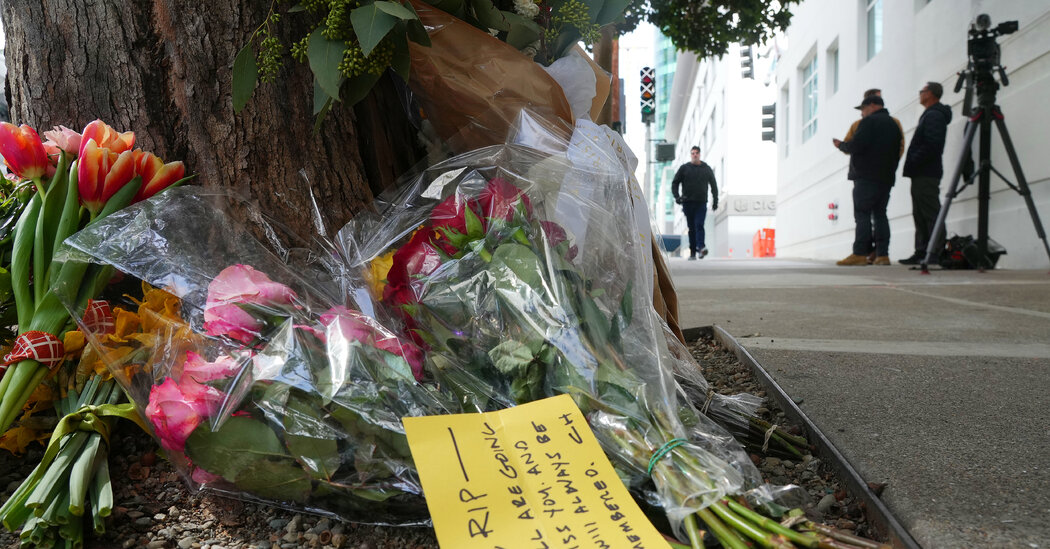
The fury erupted within hours, as word spread that the 43-year-old man who had been stabbed to death this week in an enclave of high-rise condominiums near the Bay Bridge was Bob Lee, a well-known tech executive.
The leaders of “lawless” San Francisco had Mr. Lee’s “literal blood on their hands,” Matt Ocko, a tech entrepreneur and venture capitalist in Palo Alto, Calif., tweeted. “I hate what San Francisco has become,” added Michael Arrington, the founder of the industry blog TechCrunch.
“Violent crime in SF is horrific,” Elon Musk, the chief executive of Twitter and Tesla, chimed in.
The drumbeat has built since then in the liberal city that only last year recalled its progressive district attorney amid calls for law and order and deepening frustration over the city’s homelessness crisis. While city officials agree that the murder is a terrifying tragedy and a signal that San Francisco has work to do on public safety, they’re also clashing with powerful figures in the tech sector over the nature and severity of the city’s problems with crime.
“A small minority has tried to weaponize this tragedy to advance a narrative about a crime wave that just isn’t borne out by the data in San Francisco,” Kevin Benedicto, a police commissioner and lawyer, said on Thursday. At a commission meeting earlier in the week, Mr. Benedicto complained that some on social media “are exploiting this horrific incident for political gain.”
“There are real problems about crime that need to be addressed in San Francisco,” he said in an interview. “But you’re seeing people from tech, from certain political circles, who are trying to draw explicit connections to certain policies and elected officials when we don’t even yet know the facts of the case.”
The tension comes at a precarious time, as the tech industry implodes with layoffs and San Francisco itself struggles to bring visitors, conventions and legions of remote workers back to the too-quiet area in and around its downtown.
Office vacancy rates in the city of about 808,000 people stood at more than 27 percent at the end of last year and have only worsened, according to analyses by CBRE, a real estate broker. Restaurants where tech workers once lined up for lunch have had to adapt, essentially, to a customer base with a three-day workweek, as hybrid and remote work has become commonplace.
Even the weather has raised alarms, whipsawing from sunshine that frames the Golden Gate Bridge against blue skies in postcard perfection to fierce storms that have flattened tall trees throughout the city. During the last batch of atmospheric rivers, city officials warned San Franciscans to stay away from the Financial District, where high winds had shattered windows in towering office buildings, with shards of glass raining from the landmark Salesforce tower.
Police have released few details about Mr. Lee’s death but have sought to reassure the public. “No one who commits a violent crime, or who’s a repeat offender are receiving overly lenient plea deals,” the new district attorney, Brooke Jenkins, said on Wednesday. The police chief, William Scott, reminded that “the investigation is still in the early stages.”
But fears have been inflamed, particularly since a local online news organization founded by a Silicon Valley venture capitalist, The San Francisco Standard, reported that surveillance cameras had caught Mr. Lee staggering along the deserted street outside a high rise, clutching his wounds and calling for help. At one point in the harrowing footage, he appears to be stumbling toward a car, and then falling to the ground as the car drives away.
Mr. Benedicto, the police commissioner, confirmed on Thursday that he had seen the “heartbreaking” footage, but cautioned that the police had not formally confirmed the identity of the grainy figure.
Roy Bahat, the head of the venture firm Bloomberg Beta, said the crime could motivate the local tech community to become more involved in city politics.
“Is this the moment that tech will step in and take responsibility for the city that is its home?” he asked.
Mr. Lee, a software developer, had longstanding connections in San Francisco and Silicon Valley. He rose to prominence as the chief technology officer of the payment company Square, which changed its name to Block in 2021. He went on to join MobileCoin, a cryptocurrency start-up based in San Francisco, where he was chief product officer at the time of his death.
Colleagues said Mr. Lee, who had picked up the nickname “Crazy Bob” while playing water polo and continued using it as an online handle, was instrumental in creating the mobile payment service Cash App.
“He was drawn to big, transformational challenges, and through his work he changed the world of mobile payments for all of us,” said Ron Conway, a prominent venture capitalist and political donor to local Democratic candidates. “His murder is a profound loss to the tech community, and my heart breaks for Bob’s family.”
In social media posts, Mr. Lee’s father and brother wrote that Mr. Lee, a father of two, had recently relocated to Miami from the affluent Marin County community of Mill Valley, about 15 miles north of San Francisco. In interviews, close friends said the move had been inspired by the energy of Miami’s tech community and not by disillusionment with the city where he had made much of his fortune.
“He felt like Miami was the next big thing,” said Kyle Zink, a friend and collaborator who worked with Mr. Lee at Square and as a marketing consultant to MobileCoin. “He moved because he felt like there was a shift of talent and a shift of optimism.”
Friends said he had continued to return frequently to San Francisco for business, and was wrapping up a short visit to the city on the night he was attacked. Around 2:30 a.m. on Tuesday, he collapsed on Main Street, where emergency medical workers found him bleeding from stab wounds, according to the police.
The stretch of sidewalk where he fell is lined with luxury high-rise condos and is home to the offices of a company that operates and leases data centers. The area is a tech hub, with the towering headquarters of Salesforce and Google’s San Francisco offices just a short walk away.
Many tech employees live and work in the area, which caters to them with pour-over coffee shops, grab-and-go lunch counters and a specialty grocery store that attracts a lunchtime crowd with $12 sandwiches and salads. A nearby bus depot is a hub for commuters and tempts them to linger with a boba tea shop, a gyro stand and an outdoor cinema.
The neighborhood can feel empty after dark, and the community has pushed aggressively for more law enforcement, particularly during the coronavirus pandemic. In 2019, the city proposed opening a homeless shelter in the area, and residents protested, arguing that the facility — which eventually did open — would be detrimental to public safety.
Opposition to the shelter gathered momentum after a woman trying to enter her condo building was attacked that summer by a man suffering from mental illness, one of many seemingly random assaults that occurred in succession as the pandemic emptied public spaces.
Several residents of the neighborhood said the city appeared lately to be rebounding from the gritty years of Covid-19 lockdowns. But a bodega owner in the area said that crime seemed to be rising, and that at night, the neighborhood became a backdrop for drug use and occasional sideshows. He declined to be identified, citing fears that Mr. Lee’s attacker had not been arrested and might return.
Scott Wiener, the state senator who represents the city, said the neighborhood, like many, “really took a hit during the pandemic,” adding that his own car was burglarized there about a year and a half ago. But he added that while property crime and homelessness remained issues, violent crime was uncommon in most of the city.
“No one should listen to anything Elon Musk has to say, particularly about San Francisco,” he said, calling the tech billionaire who bought Twitter “an opportunist who bought one of our anchor companies and proceeded to tear it apart.”
Mr. Lee’s death, he said, was a terrifying tragedy that deserved public attention and understandably unnerved the city, especially with no arrests. Crime statistics, he added, mean little when the victim is a loved one.
“But there’s this narrative that all of San Francisco is like Mad Max Thunderdome,” Mr. Wiener said, referring to the 1980s post-apocalyptic film, “and it’s not true.”
San Francisco recorded 56 homicides in 2017 before some violent crimes dipped during the pandemic; in 2021 and 2022, the homicide count was back up to 56, according to data from the city’s Police Department.
Last month, the board of supervisors approved a request from Mayor London Breed to spend an additional $25 million on police overtime. She has said that the Police Department is understaffed.
“People have a right to expect better,” said Matt Dorsey, a member of the board and a former communications director for the Police Department who represents the area where the attack happened. Everyone should be able to safely walk after dark in a city with as much nightlife as San Francisco, he said.
“A lot of the small businesses in the neighborhoods I represent depend on people coming here,” he said. “And this doesn’t help.”
The post Stabbing of Cash App Creator Raises Alarm, and Claims of ‘Lawless’ San Francisco appeared first on New York Times.


